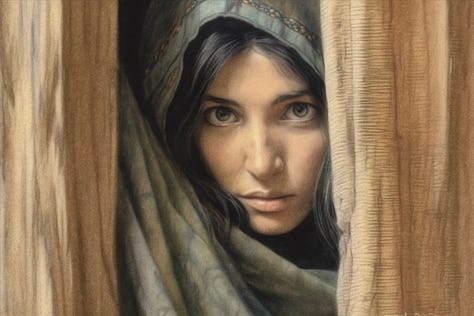The Women in Jesus' Family Tree: Outcasts Who Became Ancestors
Read Jesus' Genealogy. What Was Matthew Thinking?? An Advent Series





The Advent season offers Christians a unique opportunity to deepen their faith. While Christmas brings its own celebration, the four-week journey of Advent invites us into the story of Jesus's birth through the lives of those who experienced it firsthand—from Zechariah and Elizabeth to Mary and Joseph, from John the Baptist (in utero) to Simeon, and even King Herod.
In this four-part series, published each Sunday of Advent, we'll focus on Mary, history's most influential woman. Her story reveals not just the birth of Jesus but how God works through ordinary people to accomplish extraordinary purposes.
Advent - Week One
Outcasts Who Became Ancestors
When Matthew sat down to write his gospel, he made a revolutionary decision. In a culture where genealogies traced male lineage, he deliberately included four women in Jesus's family tree. And not just any women – he chose to highlight four stories that many would have preferred to forget:
Tamar, who posed as a prostitute;
Rahab, who was one;
Ruth, a foreigner from a despised nation and
Bathsheba, caught in one of history's most famous scandals.
Why these women? Why women at all? Given their colorful history, one might ask why these women were explicitly mentioned. (Read Matthew 1:1-16) Perhaps Matthew is telling us something profound about the nature of God's kingdom and the heritage of the coming Messiah.
Why Is She Here?
In first-century Judaism, genealogies were more than family records—they were statements of identity and legitimacy. People were defined by their bloodlines. Genealogies typically followed male lineage exclusively, which makes Matthew's inclusion of women not just unusual but startling. His original readers would have stopped short at the mention of each of these female names, wondering, "Why is she here?"
And another question: What do the stories about these women reveal about their character and the character of the woman they appear to foreshadow, Mary, the mother of Jesus?
Each woman's story offers a glimpse of the strengths of character that would be fully realized in Mary – courage in the face of social judgment, faithfulness in difficult circumstances, and willingness to play a crucial role in God's larger plan. Their presence in the genealogy isn't merely historical; it's prophetic, pointing toward the ultimate expression of these qualities in the mother of Jesus.
Let’s look at the stories of these women. Viewer discretion is advised.
Tamar: When Justice Wears a Disguise
Genesis 38 tells us a story that makes most Sunday School teachers nervous. Tamar, widowed twice and denied justice by her father-in-law Judah, takes matters into her own hands. She disguises herself as a prostitute, becomes pregnant by Judah, and forces him to acknowledge his failure to protect her. His response? "She is more righteous than I."
The story of Tamar is incredibly dark. But like most passages in the Bible, it is not only history but also a carefully crafted, well-placed story that tells us something about human nature and the nature of God.
What do we learn from Tamar? We discover that sometimes righteousness comes wrapped in questionable packages. We understand that God sees beyond our circumstances and into our hearts. But even more powerfully, we are taught that true justice may come through unexpected channels, something Mary would embody centuries later.
Rahab: Faith Knows No Borders
In Joshua 2, we meet a Canaanite prostitute who recognizes God's power and chooses to align herself with the invading people of God. She risks everything to protect Israel's spies and, in doing so, saves her entire family. She becomes not only part of Israel but an ancestor of Christ.
But did you catch the “P” word? She was a “lady of the evening.” Does this explain why Jesus was so kind and gracious to women who had been compromised by sexual sin? The woman caught in adultery (John 8) and the Samaritan woman he met at the well in Samaria (John 4) were treated with unconditional but unfailing love from the Lord.
Rahab teaches us that trust in God matters more than blood background and transcends social boundaries. Wounded women could be partners with God’s purposes no less than pure and proper women who did things right. Again, this points to Mary. As a pregnant, unmarried woman, she was undoubtedly the center of gossip in Nazareth. But she was never scorned or abandoned by Jesus.
Ruth: Love Crosses Boundaries
Several years ago, I wrote a book about Ruth. She is the next woman in Matthew’s list from his genealogy. The Ordinary Ways of God is a deep-dive exegesis into the precious and stunningly modern story of Ruth. It was a joy for me to write this book. But in doing the research for it, I discovered this remarkably bold, brave, and beautiful woman who cast her cares in favor of a God she never hears from directly. Mary could relate.
The book of Ruth—all of 85 verses long— reads like a romantic drama, but at its heart is a story of extraordinary loyalty and courage. The Moabite widow commits herself to Israel's God and people, declaring, "Your people will be my people, and your God my God." Through her faithfulness, she becomes the great-grandmother of King David.
Bathsheba: Redemption from Tragedy
Matthew doesn't even name the fourth woman—Bathsheba is referred to only as "the wife of Uriah." Is this a slam? Or is Matthew highlighting her tragic story? After being seduced by King David, losing her husband to a violent murder, and grieving her first child's death, she eventually becomes the mother of Solomon and an influential queen mother.
From Bathsheba, we learn about trusting in God no matter what, that God redeems even the darkest situations, and that He never forgets victims of power and abuse. Bathsheba is a model of walking through grief and loss—a path that Mary would also be called upon to walk in the days of Jesus’ crucifixion and death.
The Theological Significance
Through these women and their stories, we see how God's grace transcends every conceivable boundary—social, ethnic, and moral. The Messiah's family tree deliberately includes unsavory survivalists like Tamar, foreigners like Ruth. It highlighted those branded as immoral, like Rahab, and those caught in scandal, like Bathsheba. Each narrative involves human failure, from deception to prostitution to murder, yet God weaves these broken threads into His redemptive plan.
As we enter into the Season of Advent, we should ask what this means. And its meaning comes to us in plain view: From the gospel’s opening verses, we are shown exhibits A, B, C, and D to prove that Christ Jesus came into the world to save sinners. He came for all people, not just the religiously respectable.
But there is more. Each woman's story showcases a dramatic reversal of fortune—from outcast to ancestor, from marginalized to matriarch—prefiguring Mary's life and her song (called the Magnificat) about God lifting the humble and casting down the mighty. (The subject of our next post.)
Shadows in the Past
The inclusion of these four women show us the gospel as a vivid account of a rescue mission by a loving God into a land where broken people are held captive behind enemy lines. The Gospel is not a fairy tale that is buoyed by rainbows, butterflies, and ponies. There are real people with real problems and the gospel hope can reach them where they really are.
This genealogy, with the inclusion of these women, shows that the Gospel of Jesus Christ is not to be shared without the telling of their stories. This honors their courage and acknowledged their pain.
The genealogy culminates in Mary, a young woman from Nazareth. She might have seemed an unlikely choice to play a crucial role in God's plan. Yet she became the mother of Jesus, making her story the pinnacle of God's pattern of working through unexpected people.
Prayer
Loving Father,
We thank You for the stories of Tamar, Rahab, Ruth, Bathsheba, and Mary. Their lives remind us that Your love reaches into the darkest corners of human experience, bringing hope and redemption. Thank You for seeing beyond society's judgments to the heart of each person You choose to use for Your purposes.
Help us to see others as You see them – not through the lens of their past or society's expectations, but through Your eyes of grace and possibility. Give us the wisdom to recognize Your work in unexpected places and people, and the courage to welcome those whom others might overlook.
May these ancient stories strengthen our faith in Your redemptive power and remind us that no one is beyond the reach of Your transforming love. Help us to be agents of Your grace in our communities, following the example of these brave women who played such vital roles in Your plan of salvation.
In Jesus's name, Amen.
The Rev. David Roseberry, an ordained Anglican priest with over 40 years of pastoral experience, offers leadership services to pastors, churches, and Christian writers. He is an accomplished author whose books are available on Amazon. Rev. Roseberry is the Executive Director of LeaderWorks, where his work and resources can be found.




